Rock guitarist Derek Day’s nascent career speaks for itself. At 24, he’s toured with Steve Vai, Living Colour, and Lynch Mob, and has plenty of ebullient charm and rocket-fueled ambition. When asked where he sees himself in five years, he says, with mild reservation, “I will be 100 percent playing the largest stages on the planet.
“There’s no way to not sound bad when you say that,” he observes, “but it’s only because I really believe the things I’m trying to say.”
Day’s latest single, “Click on Me,” was released with a music video in September 2020, and shows just what makes him so exciting: guitar work with fangs, slightly overdriven and snarling, combined with rasping, ruthless, metal-esque vocals that could kill. If it’s not obvious with a quick listen, the song expresses social commentary on widespread internet addiction.
“One of the things that I love about the song is the way it ends,” says Vernon Reid, legendary guitarist of Living Colour and producer and co-writer of “Click on Me.”
“‘When did we volunteer for this slavery?’ And boom! It leaves you with this very stark question,” Reid explains. “It doesn’t sugarcoat it; it doesn’t hold your hand. It forces you to consider what’s been presented.”
There’s even more to Day than the vicious attitude and guitar incisors he displays on that tune. He’s a dedicated songwriter that’s passionate about arranging, who says he draws inspiration from David Bowie, who, Day adds, “knew how to arrange a song like no one else.” One of his goals is to write a film score. “It would just be a blast to sit down for hours on end. I love Tom Waits—he creates atmospheres. I feel like I could do that.”
Looking at his trajectory so far, yes, it seems he could do that, and much more. When we reached Day and Vernon Reid for this interview, Day was in a typically buoyant mood. “I’ve been writing and recording with the band every single day, so it’s just been really busy, and having calls such as these and stuff ... not a moment to sleep.” He laughs, but with his work ethic and high-bar goals, he won’t be caught napping anytime soon.
How are you feeling about the way “Click on Me” has broken out?
Derek Day: Feeling great. This is the most success I’ve had on a release. I’m just an indie artist. I feel like the content is something I’m really proud of, and something I want to keep pushing. Just this one single itself—I’ll always be promoting it. I’ll always send it to people—if anything, for some form of social purpose.
What was it like working with Vernon?
Day: It was very intimidating at first. He’s a very intimidating guy, because he’s a genius—musically, but also with life. He’s extremely well-read and he’s really smart. But then I just felt overwhelmed with gratitude. Everything he says is such a piece of knowledge, and it’s always new. It was kind of surreal, to say the least.
And Vernon, what was it like for you working with Derek?
Vernon Reid: Derek Day is 100 percent rock ’n’ roll. All the times I’ve seen him play, being with him in the studio, being with him in my house—he’s the same guy. He just has it. And I love his playing because it reminds me a little bit of the late, great Tommy Bolin.
He’s got chops but he’s very melodic. He’s not playing, like, “Okay, here comes the fabulous arpeggio, because that’s the script.” That’s not what he does. He plays what’s in his heart. And then, vocally he’s crazy. There’s a bit of Jeff Buckley in his voice, a bit of Freddie Mercury. He’s an outstanding vocalist as well as guitarist. And he’s got the songs to support. His songs are great context for his enthusiasm, vocals, and his great guitar playing.I’m just psyched for America to get on the program. He’s got it; he really has got that thing.
You guys toured together.
Day: Yeah, that’s how we got to work together on writing.
Can you talk about how that developed?
Reid: We met via Derek’s manager, Ali Shayesteh. He’s an old friend. And he called me and he was very excited about this young guitar player and singer/songwriter that he hooked up. And Living Colour was doing a West Coast run, and he said maybe we could get some dates. Really, from the first time I heard him play and sing, I was like, “That kid’s legit.”
Day: We kind of became a family with the crew and everything. I think that sort of sparked us, right? ’Cause the following January, that’s when we started writing. I left on New Year’s Day, at three in the morning—took a red-eye out to Staten Island, [New York] where Vernon is, and we just started writing immediately. That’s how we wrote “Click on Me.” We’d meet at 7 or 8 a.m. and just write all afternoon. We got a bunch of stuff, but that was the one where I was like, “Alright, let’s make this one happen.”
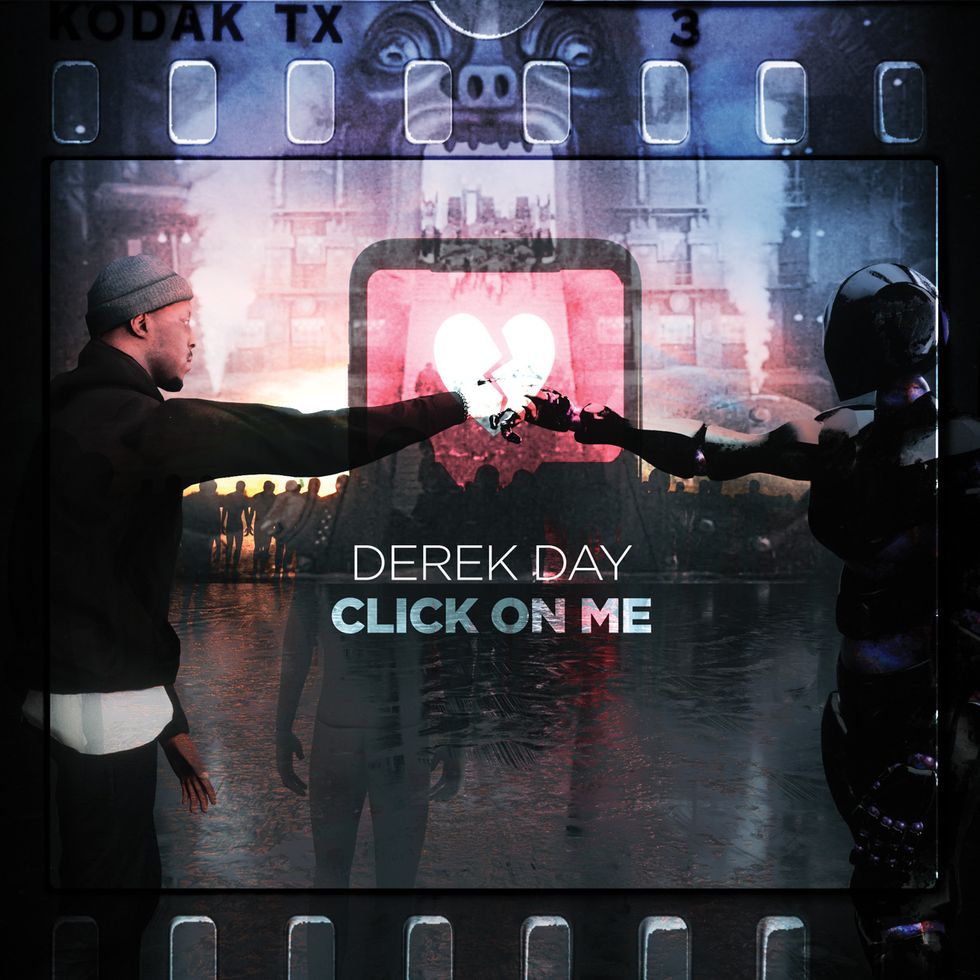
“This is the most success I’ve had on a release,” Day says of his pointed single, “Click on Me.” “I feel like the content is something I’m really proud of, and something I want to keep pushing.”
What was it about that song that made you realize it was the one?
Day: Well, the first thing you do when you write with someone is you just talk. You’re just like, “What do you like? What do you think is cool?” It’s kind of awkward. But we both had so much in common. We both love sci-fi and stuff. We love Star Wars. We’re just goofing off, and that led into technology. And he told me, “Man, I’ve really been wanting to write a song about this whole phone thing, this whole social media thing. I know some writers are kind of pointing to it, but no one’s really saying what it really is.”
Reid: We were talking about it and knocked around phrases, and it started to emerge. The song used us to write it. What I like about it is that it talks about something that’s such an impact on our lives, but there are no songs about it. We’re overwhelmed by [the internet]—we’re addicted to it. It’s weird because it’s all subconsciously chasing us around, it’s telling us things that we do. It’s a weird, selective space. And that’s the thing the song attempts to speak to. I don’t know of any other song that’s taken that on.
Day: That was the one that got completed fully, pretty much to the T, in a day. And then we spat around a bunch of other ideas. We wrote two other full songs. One is more of a ballad, more personal to my family life. Another one is perfect for these times. It’s about the new form of plague happening. That’s actually something I would love to pick up on.
Tell me more about the co-writing process.
Day: I came with these licks and riffs, the key of the song, but Vernon really shaped it. It was kind of sporadic. A lot of unnecessary notes here and there. I was just excited, like, “Here’s this idea!” I had five separate ideas in the key of D, and we narrowed it down to maybe two or three. But Vernon’s got that ear. He’s just like, “No, we don’t need that, this is going to take away from the point.” Then he wrote a bunch of the words, like, “How did no place become the place to be?” He would give me these hard lines and they would literally just push me back on my feet. And I would kind of fill in the gaps here and there. Honestly, we were so in this universe, I can’t say anything is mine without him being a part of it. It was this big messy blur. Songwriting is weird [laughs].
Reid: Also, what I love about this song is it’s very stark. The way Derek goes, “I want to go viral.” When he sings it, he sounds almost like a spoiled brat. It sounds almost monstrous—that borderline obsession that’s in his voice.
After Day opened dates with Living Colour, he and Reid became friends, and then, songwriting and production collaborators. Here, Reid plays his PRS Signature Vela Egyptian, while Day bears Milkshake, his Fender American Professional II Stratocaster. Photo by David Simchock
What was the recording process like?
Day: It was super easy. We did maybe three takes and then we chose the second one, or something. Same with the other songs that we recorded. I had to step up to the plate because I don’t want to mess up in front of this guy.
Vernon, was there any particular approach you took as the song’s producer?
Reid: I wanted the song to have a very raw [feel]. I’m listening for the take that really crystallizes the groove, the rawness of it. ’Cause we did the song, but then he went and did it with the band, and I said, “Man, the band is killing me!” It’s just got this muscular kind of swagger to it, is the best way I could put it. And I wanted to capture that. And Derek, I mean he’s a joy to work with.
Let’s talk about gear. Derek, how do you get your tone?
Day: Tone is crazy, ’cause in the studio it’s one thing and live it’s another thing. In the studio you try everything and anything. You’re literally plugging into a toilet to see if it sounds alright [laughs]. Live, I’ve been using these really cool pedals from this Dutch company called NEXI: a Dutch Screamer and the NEXI Overdrive. Then there’s the classic Boss [BD-2W Blues Driver] as well. Those are weird, ’cause they’re kind of on the cheaper side of things, but if you know how to make it work with your amp, you can get just a creamy, beefy sound. That’s what I’m going for. Kind of creamy, beefy for the chords and whatever I’m playing—meat and potatoes. I use a Fender Bassbreaker. It’s just a 2x12. I’m endorsed by Fender so they gave it to me for the Living Colour tour. I fell in love with it!
The solo tone is pretty different. My goal is to make it sound like something you would hear in space. There’s a really cool pedal called the FreqOut, given to me by my friend, Thomas Nordegg, who was Zappa’s guitar tech and is now Steve Vai’s. It helps me sustain notes. But I try not to use too many pedals. Every now and then I’ll do a whammy pedal, but those are just little moments. All of these I’m mentioning are tough. You just gotta spend hours turning knobs half a centimeter. But all of the tone is in your fingers at the end of the day.
What are your guitar preferences?
Day: I’m a Stratocaster guy, but I’m moving more towards the Tele. But I need a whammy bar, and that’s because I love to play all the notes in between the 12 notes. I was never so much a gear freak. I performed on the street for the first 10 years of my career, so just having a piece of wood with strings on it is like my favorite thing ever[laughs].
I love the Stevie Ray Vaughan Stratocaster. I have one of those and it’s just the kind of tone that makes you want to keep playing. You never want to put the guitar down. It just makes it so personal. You can really hear your fingers. I’m down for any pickup that also doesn’t get in the way. It just lets you work a little hard. I don’t know …personally I don’t have any super preference—as long as it’s intact, it’s like my favorite guitar.
Derek Day’s go-for-it style of performing is captured in this action shot. Reid describes the highly focused Fender flogger as “100 percent rock ’n’ roll.” Photo by JPM Photography
Was busking a big part of your musical upbringing?
Day: Yeah. I went out there when I was like 13. I’ve been singing since I was a kid, and I’d just been wanting to do that for so long—walking down the streets of Santa Monica. That helped me build my chops—mess up a lot, break strings, or learn how to play an untuned guitar for like three songs. I was really just self-taught. And, of course, I attended a couple of after-school classes: beginning piano, beginning classical guitar. If there’s something free, I would just go run to it. “Alright, teach me this.” It was all self-motivated.
Who are your main influences on guitar?
Day: Steve Vai’s a big one. I just love how effortless he is with the guitar. And Stevie Ray Vaughan, just because, ah! He’s crazy man. Ever since I was a kid, he taught me to try to break your guitar while you’re playing it. With your fingers, just break it. John Coltrane is another one. I’m intrigued by Coltrane because no matter how hard I try, I still have to debunk him. I’m like, how do I play like a saxophone player on guitar? There’s ways; I know there’s ways.
Then Ray Charles, Stevie Wonder—a lot of keyboardists. David Bowie. Tom Waits—he knows how to create an atmosphere. We all know Tom. In his later years maybe he’d use a frying pan as a guitar pick. He taught me how to be inventive. Like Stevie Ray, he plays it so percussively. I feel like they all taught me to play my guitar like it’s another instrument. Because I feel like Coltrane plays the sax as if it was a theremin or something. There’s just air, and there’s nothing stopping him.

Guitars
Fender American Professional II Stratocaster (named Milkshake)
Fender American Performer Telecaster Hum (named Band-Aid)
Fender Acoustasonic
Fender Redondo
Amps
Fender Bassbreaker
Effects
NEXI Industries Dutch Screamer
NEXI Industries Overdrive
NEXI Industries Looper
NEXI Industries Delay
Dunlop Cry Baby 535Q-B
DigiTech Whammy 5 Pitch Shift Pedal
DigiTech FreqOut
Boss BD 2-W Blues Driver
Ernie Ball VP JR
TC Electronic Polytune 2 Mini
Strings and Picks
Fender Bullets (.010–.046)
Sheptone sets (.010–.046)
Anatomy of Sound Heart Beat and Power picks
What’s your creative process like?
Day: I guess the trick for me is just get to the place where you can be the most honest. What I do is I lock myself in a room, maybe with my dog—I have a German shepherd. And I make sure I have at least six hours of just me. I make sure no one talks to me or texts me or anything. Usually the first four hours are nothing. And then it’s like the last two hours you write your “Stairway to Heaven” or your “Bohemian Rhapsody.” That’s when you start writing genius stuff.
Actually, ever since Vernon told me, “Hey I want to write about this,” that has planted a seed. Before I write about something, I’m going to state what I want to write about and say it out loud, even if it’s just to myself. That way it’s just floating around in this closed room and it’ll come back to you. But, really, just putting time in and being honest any way you can, even if that means doing a handstand for 10 minutes. And be brutal, too. Like “I don’t like that person anymore,” or “I do and I’m in love with this person.” You’ve just got to be stupid brutal—really surprise yourself with your honesty, and then you get the best song.
Where do you usually take inspiration from?
Day: Definitely from history. I’m a history buff so a lot of the songs reference a historical event. Whether it be World War II or something. My name “D. Day” is kind of based on that as well. World War II is a big thing I excelled at in history classes. And that led me to more things, like the Mayans and stuff. I’m part Mayan. Also I think we all are inspired by nature. The vibrant colors kind of help me describe things. Or feeling the soot of freshly watered dirt. The last thing I would say is just geniuses, like Vernon Reid. Or, for example, I talked on the phone with Steve Vai for a minute, and it was seriously worth five years of college. I just try to surround myself with geniuses, ’cause then I just go home and start working.
Do you have any other music lined up for future release?
Day: Yeah, definitely. I have like four more songs in the bank, just chillin’. Two of ’em I recorded with Vernon and two other ones just throughout the last year or so. I kind of just recorded these songs for my own health. I felt like I needed to, and they sound really great. I might try to release something either December or first thing January. And it’s just going to be a part of either a five-song EP with “Click on Me” on it, or … I don’t know. Nowadays it’s hard to tell what the strategy is? Just like singles, maybe. But I have other tunes that will be out very soon actually. No later than spring.
What’s something you’ve learned from your career?
Day: There’s a lot of sacrifice. A lot of those Saturday nights you have to just stay home and work. That’s the reality of it, because the next day someone’s going to call you and they’re going to need you for something, and you’ll be ready. Or you won’t be! And then that’ll determine your entire career. Think about above and beyond and go way further.
When the Jam in the Van crew dropped anchor in Anaheim for the NAMM show in January 2020, Derek Day and his band climbed aboard for a short set that provides plenty of close-ups of his classic-rock-inspired fretwork.




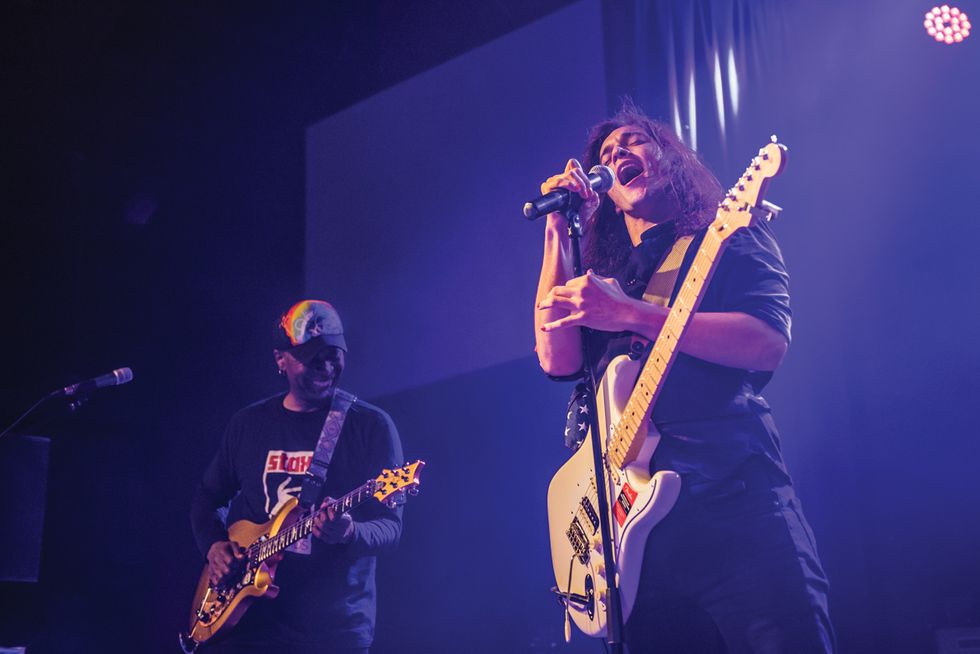
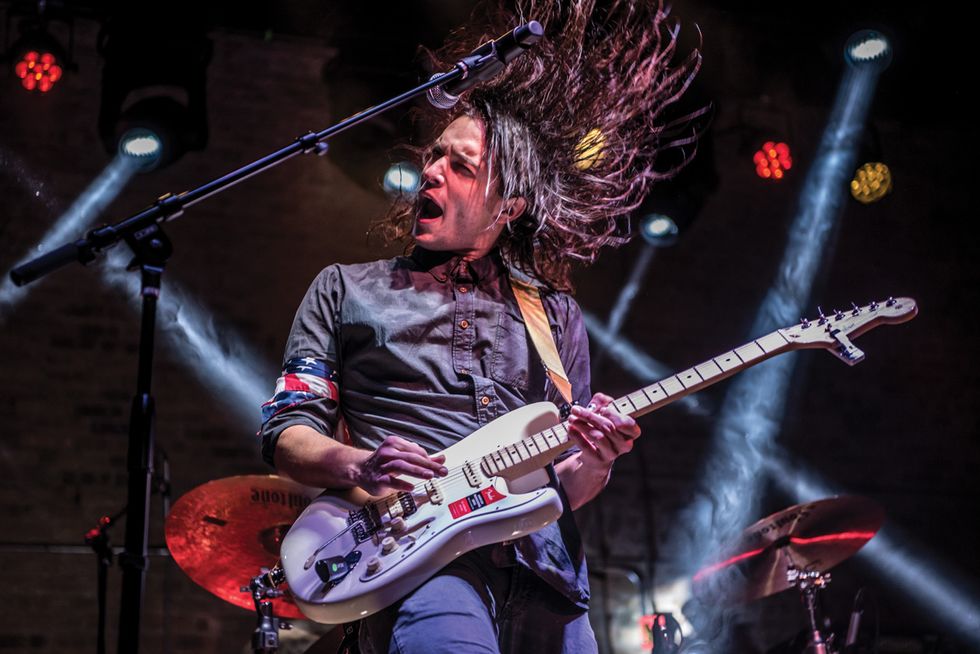







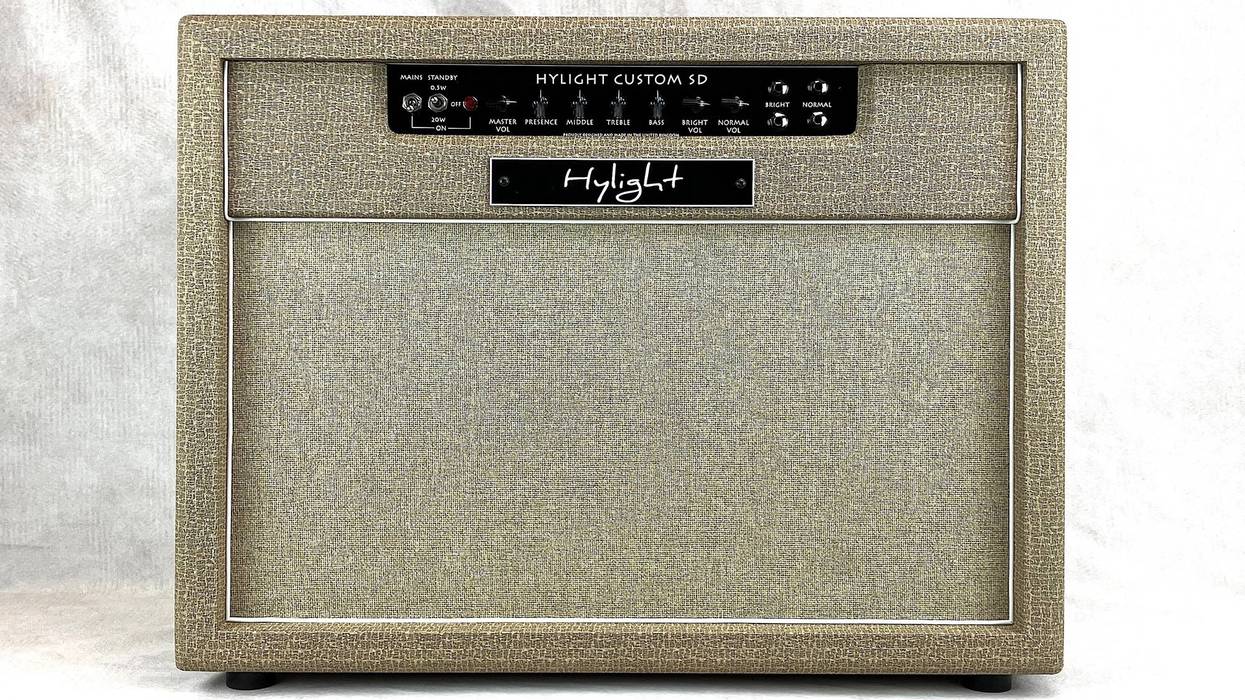
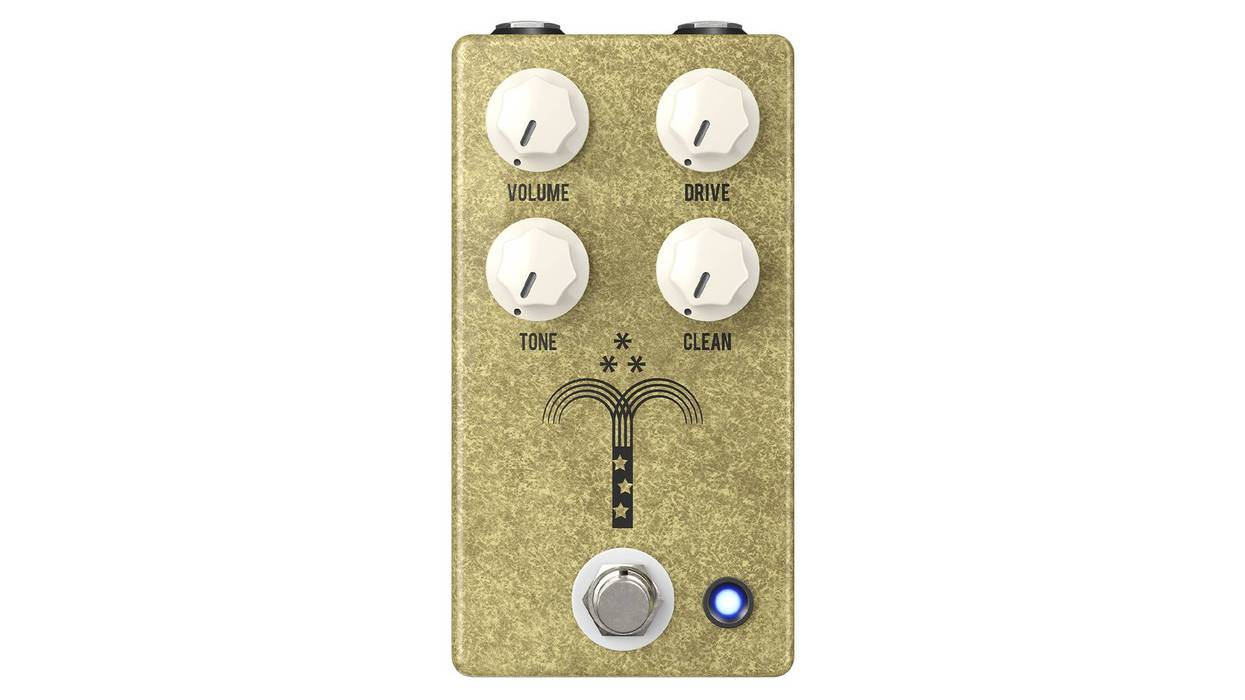
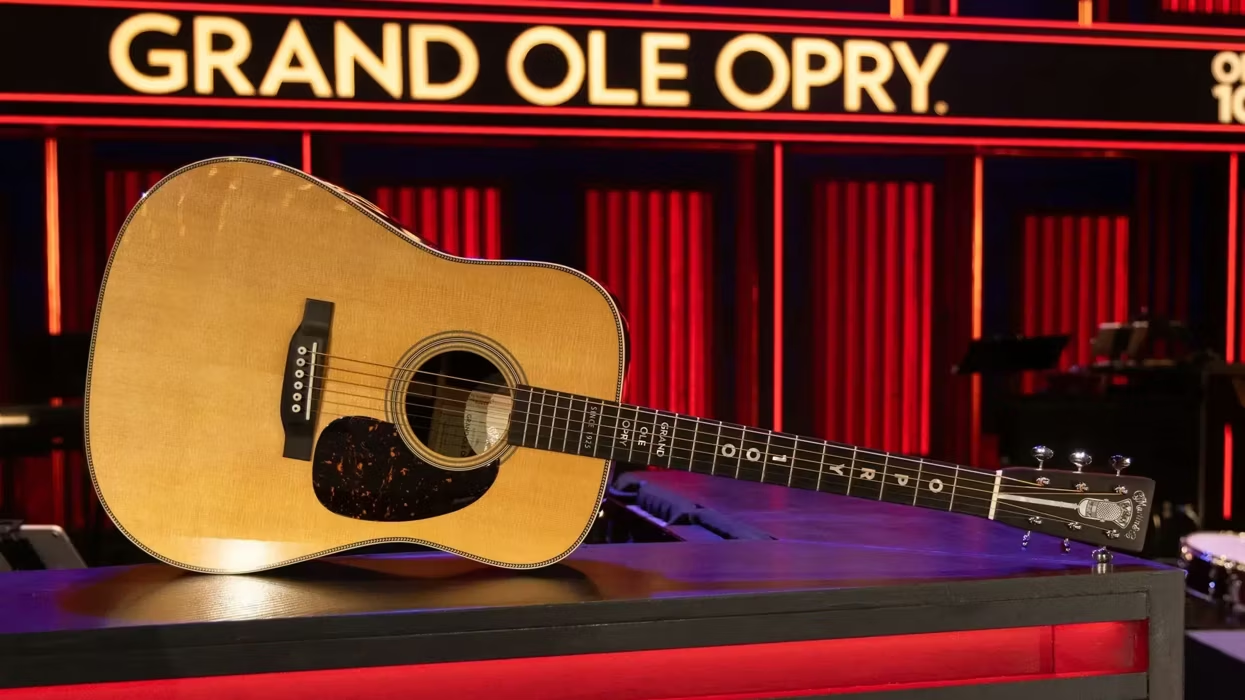


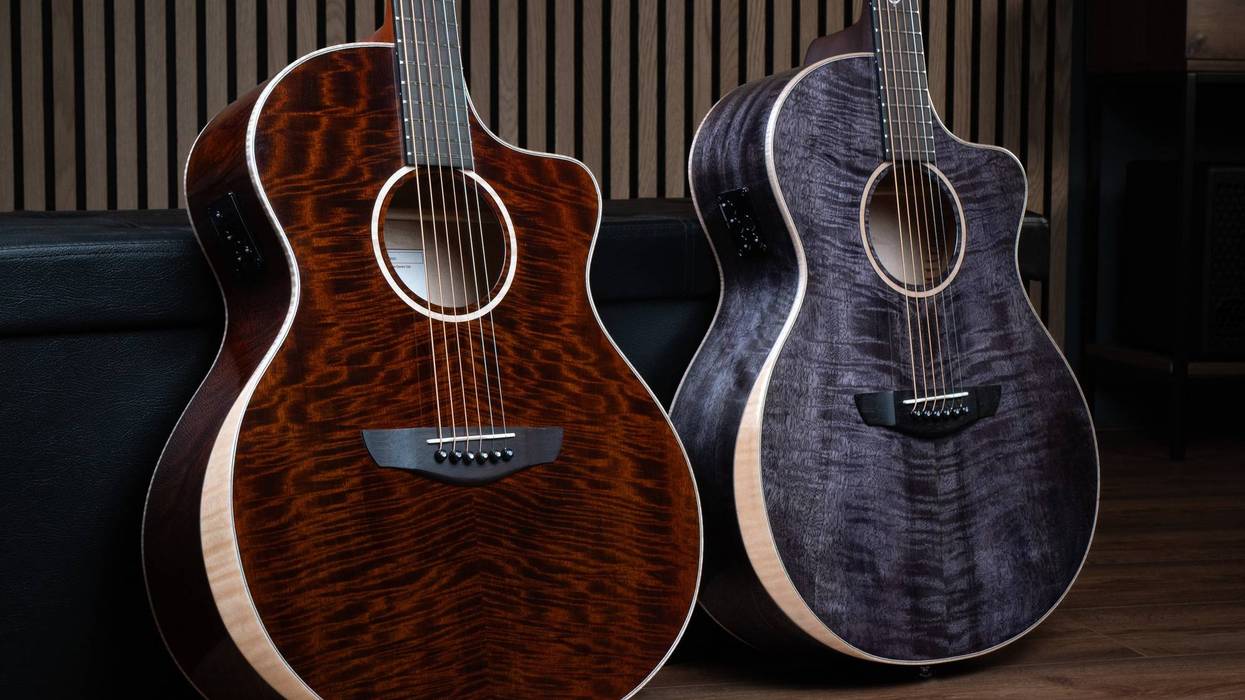

![Rig Rundown: Russian Circles’ Mike Sullivan [2025]](https://www.premierguitar.com/media-library/youtube.jpg?id=62303631&width=1245&height=700&quality=70&coordinates=0%2C0%2C0%2C0)
















![Rig Rundown: AFI [2025]](https://www.premierguitar.com/media-library/youtube.jpg?id=62064741&width=1245&height=700&quality=70&coordinates=0%2C0%2C0%2C0)











